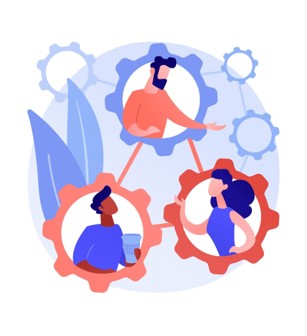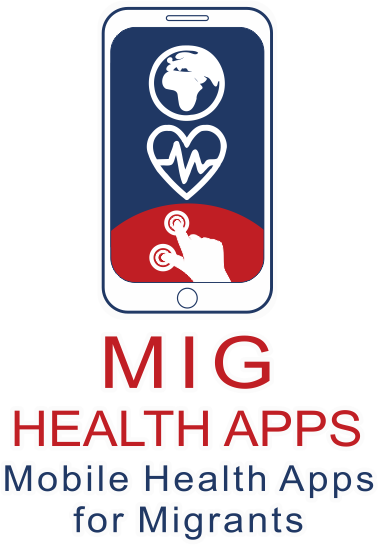08 Health Apps for Children’s Care (Course8-EN)
Health Apps for Children’s Care 
This online module is addressed to trainees.
Objectives

This module is a comprehensive block designed to address the topics; what is a newborn and the neonatal period, i.e. the period comprising the first 4 weeks of a baby's life, where a lot of abrupt changes are encountered (Goyal, 2020). It is also intended to provide information on breastfeeding and the types of breastfeeding found, and on the complementary feeding that it is advisable to provide to the child during the first years of life. Another aspect covered in this block is sleep habits in newborns, and the problems that can arise if this is not done properly. Finally, various applications related to newborns and their care will be provided, which learners will have to know how to differentiate and know their characteristics. All the competencies will be achieved through explanatory videos, practical exercises and interactive sessions.
Image by vectorjuice on Freepik
Images by vectorjuice on Freepik
LessHealth Apps for Children’s Care 
This online module is addressed to trainees.
Objectives

This module is a comprehensive block designed to address the topics; what is a newborn and the neonatal period, i.e. the period comprising the first 4 weeks of a baby's life, where a lot of abrupt changes are encountered (Goyal, 2020). It is also intended to provide information on breastfeeding and the types of breastfeeding found, and on the complementary feeding that it is advisable to provide to the child during the first years of life. Another aspect covered in this block is sleep habits in newborns, and the problems that can arise if this is not done properly. Finally, various applications related to newborns and their care will be provided, which learners will have to know how to differentiate and know their characteristics. All the competencies will be achieved through explanatory videos, practical exercises and interactive sessions.
Health Apps for Children’s Care 
This online module is addressed to trainees.
Objectives

This module is a comprehensive block designed to address the topics; what is a newborn and the neonatal period, i.e. the period comprising the first 4 weeks of a baby's life, where a lot of abrupt changes are encountered (Goyal, 2020). It is also intended to provide information on breastfeeding and the types of breastfeeding found, and on the complementary feeding that it is advisable to provide to the child during the first years of life. Another aspect covered in this block is sleep habits in newborns, and the problems that can arise if this is not done properly. Finally, various applications related to newborns and their care will be provided, which learners will have to know how to differentiate and know their characteristics. All the competencies will be achieved through explanatory videos, practical exercises and interactive sessions.
Course Description

Objectives
Experiential Training Activity 8 on Health Applications for Child Care is a comprehensive block designed to address the topics; what is a newborn and the neonatal period, i.e. the period comprising the first 4 weeks of a baby's life, where a lot of abrupt changes are encountered (Goyal, 2020). It is also intended to provide information on breastfeeding and the types of breastfeeding found, and on the complementary feeding that it is advisable to provide to the child during the first years of life. Another aspect covered in this block is sleep habits in newborns, and the problems that can arise if this is not done properly. Finally, various applications related to newborns and their care will be provided, which learners will have to know how to differentiate and know their characteristics. All the competencies will be achieved through explanatory videos, practical exercises and interactive sessions.
Participants and roles
- Newcomer migrants; learners. Migrants who have recently become or are about to become parents.
- Migrants Peers; learners or trainers after being trained as trainers. When they will attend as trainees, they could play a role of supporting the Newcomer Migrants along the training process, including support in overcoming language barriers.
- Supports: learners or trainers after being trained as trainers. When they will attend as trainees, they could play a role of supporting the Newcomer Migrants along the training process, including support in overcoming language barriers.
Learning outcomes
- Learners will acquire basic knowledge about newborns and their characteristics.
- Learners will acquire knowledge about the importance of breastfeeding and complementary feeding.
- Learners will acquire knowledge about the importance of sleep habits.
- Learners will know the applications related to newborns and their characteristics (daily record, feeding, paediatric advice, types of crying, sleeping and breastfeeding habits), and will learn how to use them appropriately.
Training Contents
- What are newborns?
- Types of newborns
- Characteristics of newborns
Duration
Total Duration: 7 hours
- Teaching session: 3: 00 hours
- Self-learning supported by online training tools: 1:30 hours
- Experiential training session: 2:30 hours
-
Resources
- Training material: PPT for didactic sessions
- Training material: activities, kahoot and quiz
- Online platform
- Health Applications related to newborns
- Others: video ("youtube").
Bibliography
Cannizzaro, C., y Paladino, M. (2011). Fisiología y fisiopatología de la adaptación neonatal. Anestesia, Analgesia y Reanimación, 24(1), 59-74.
Goyal NK. The newborn infant. In: Kliegman RM, St. Geme JW, Blum NJ, Shah SS, Tasker RC, Wilson KM, eds. Nelson Textbook of Pediatrics. 21st ed. Philadelphia, PA: Elsevier; 2020:chap 113.
KidsHealth.Parents.BreastfeedingvsFormula Feeding. 2018. https://kidshealth.org/en/parents/breast-bottle-feeding.html
Younger, J., y Noble, L. (2022). Policy Statement: Breastfeeding and the Use of Human Milk. American Academy of Pediatrics, 150(1). https://doi.org/10.1542/peds.2022-057988
World Health Organisation. Premature births. https://www.who.int/news-room/fact-sheets/detail/preterm-birth
Experiential Training Activity 8 on Health Applications for Child Care is a comprehensive block designed to address the topics; what is a newborn and the neonatal period, i.e. the period comprising the first 4 weeks of a baby's life, where a lot of abrupt changes are encountered (Goyal, 2020). It is also intended to provide information on breastfeeding and the types of breastfeeding found, and on the complementary feeding that it is advisable to provide to the child during the first years of life. Another aspect covered in this block is sleep habits in newborns, and the problems that can arise if this is not done properly. Finally, various applications related to newborns and their care will be provided, which learners will have to know how to differentiate and know their characteristics. All the competencies will be achieved through explanatory videos, practical exercises and interactive sessions.
- Newcomer migrants; learners. Migrants who have recently become or are about to become parents.
- Migrants Peers; learners or trainers after being trained as trainers. When they will attend as trainees, they could play a role of supporting the Newcomer Migrants along the training process, including support in overcoming language barriers.
- Supports: learners or trainers after being trained as trainers. When they will attend as trainees, they could play a role of supporting the Newcomer Migrants along the training process, including support in overcoming language barriers.
- Learners will acquire basic knowledge about newborns and their characteristics.
- Learners will acquire knowledge about the importance of breastfeeding and complementary feeding.
- Learners will acquire knowledge about the importance of sleep habits.
- Learners will know the applications related to newborns and their characteristics (daily record, feeding, paediatric advice, types of crying, sleeping and breastfeeding habits), and will learn how to use them appropriately.
- What are newborns?
- Types of newborns
- Characteristics of newborns
Total Duration: 7 hours
- Teaching session: 3: 00 hours
- Self-learning supported by online training tools: 1:30 hours
- Experiential training session: 2:30 hours
- Training material: PPT for didactic sessions
- Training material: activities, kahoot and quiz
- Online platform
- Health Applications related to newborns
- Others: video ("youtube").
Cannizzaro, C., y Paladino, M. (2011). Fisiología y fisiopatología de la adaptación neonatal. Anestesia, Analgesia y Reanimación, 24(1), 59-74.
Goyal NK. The newborn infant. In: Kliegman RM, St. Geme JW, Blum NJ, Shah SS, Tasker RC, Wilson KM, eds. Nelson Textbook of Pediatrics. 21st ed. Philadelphia, PA: Elsevier; 2020:chap 113.
KidsHealth.Parents.BreastfeedingvsFormula Feeding. 2018. https://kidshealth.org/en/parents/breast-bottle-feeding.html
Younger, J., y Noble, L. (2022). Policy Statement: Breastfeeding and the Use of Human Milk. American Academy of Pediatrics, 150(1). https://doi.org/10.1542/peds.2022-057988
World Health Organisation. Premature births. https://www.who.int/news-room/fact-sheets/detail/preterm-birth

Objectives
-
What are newborns?
-
Types of newborns
-
Characteristics of newborns
 Competences
Competences
-
Newborns and their characteristics
-
The importance of breastfeeding and complementary feeding
-
The importance of sleep habits.
-
Learners will know the applications related to newborns and will learn how to use them appropriately.
Duration: 3 hours
Objectives
-
Mastering the use of newborn applications.
Duration: 2 hours, 30 minutes
Objective
- Self-Assessment via a Quiz
Duration: 1 hour, 30 minutes
Calendar
Announcements
- - There are no announcements -
